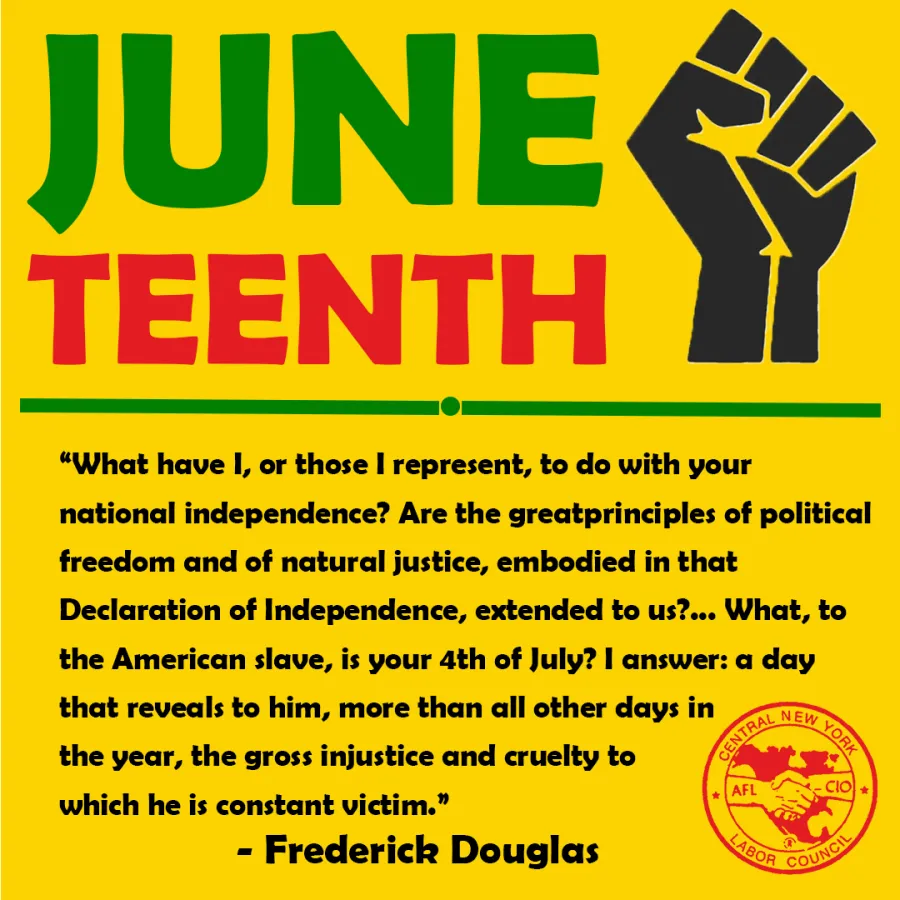Juneteenth - Resources from the Central New York Labor Council

What have I, or those I represent, to do with your national independence? Are the great principles of political freedom and of natural justice, embodied in that Declaration of Independence, extended to us?... What, to the American slave, is your 4th of July? I answer; a day that reveals to him, more than all other days in the year, the gross injustice and cruelty to which he is the constant victim. ~ Frederick Douglas.
Juneteenth commemorates the end of slavery in the United States. When the Emancipation Proclamation became official on January 1, 1863, it wouldn’t be until 1865 that the Executive Order could be enforced in Texas. Juneteenth celebrates freedom and the opportunity for black people to simply live but is also a day where the inequalities embedded within this nation’s founding become more visible. After all, the first Juneteenth was in 1865 while the more commonly known Fourth of July, celebrates American independence in 1776.
Reflecting on how labor and race are linked in this country is important. Slavery was an economic institution founded on the stolen labor of the enslaved. After the abolition of slavery, through sharecropping and Jim Crow laws, black workers would labor under unjust situations oftentimes being shut up out of certain jobs and not having the same rights as white workers. For example, the National Labor Relations Act of 1935, a cornerstone in achieving better workplace conditions, excluded domestic workers and farmworkers, sectors at the time predominantly populated by black people. Labor history is racial history. On this Juneteenth, we have compiled together a list of sources with the aim of highlighting black history, including black labor history, within the United States. This list isn’t exhaustive, but serves to shed light on a history that is often left out. We encourage everyone to not only absorb and reflect on these readings, but to strive to ask: How can I do my part to actively be anti-racist?
General Sources
- Institutionalized Racism: A Syllabus - https://daily.jstor.org/institutionalized-racism-a-syllabus/
- POC Online Classroom - http://www.poconlineclassroom.com/racial-communities-and-identities
Books
- The New Jim Crow: Mass Incarceration in The Age of Colorblindness - Michelle Alexander
- So You Want To Talk About Race - Ijeoma Oluo
- Why Are All the Black Kids Sitting Together in the Cafeteria?: And other Conversations about Race - Beverly Daniel Tatum
- Black Feminist Thought: Knowledge, Consciousness, and the Politics of Empowerment - Patricia Hill Collins
- The Color of Law: A Forgotten History of How Our Government Segregated America - Richard Rothstein
- The Condemnation of Blackness: Race, Crime, and the Making of Urban America - Khalil Gibran Muhammad
- White Rage: The Unspoken Truth of Our Racial Divide - Carol Anderson
- Women, Race, and Class - Angela Davis
Podcasts
- Code Switch
- Still Processing
- 1619
- Intersectionality Matters!
Films
- 13th
- When They See Us
- I Am Not Your Negro
- Whose Streets
- LA 92
For more history about Juneteenth, click here.